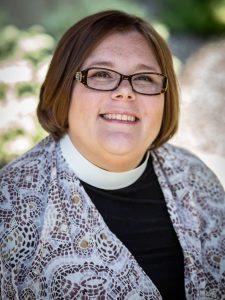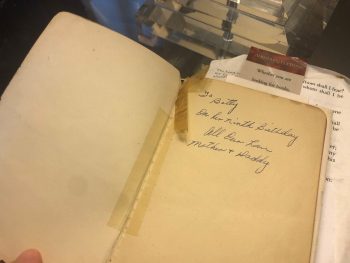 By Pastor Norma Malfatti
By Pastor Norma Malfatti
My grandmother was a night owl. From the time I was old enough to stay up past an 8:30 bedtime, I learned that my grandmother never went to bed before midnight and she never, ever went to bed without reading her Bible. As a young adult, when I would come quietly into the house from a night out with friends or traveling home from college, there’d she be, reading her Bible in bed or in her rocking chair.
Sometimes we would stop and read together or she’d tell me about the story she was getting ready to read. (She knew her BIble backwards and forwards after so many years of daily reading.) She thought King David was a rascal, wondered about what it was like to live with all those laws in Leviticus as a way of being, and was always in awe of Jesus’ healings.

Norma’s mom received her life-long Bible from her parents on her ninth birthday. (See photo below for the inscription.)
I can still see her Bible on her nightstand – a worn, green cover that was falling off, bookmarks and scraps of paper sticking out with prayers and thoughts. That Bible is still packed away in a box of her keepsakes that I peek into from time to time.
“What would it look like if everyone in our congregations connected with the Holy Spirit every day by reading Scripture and wrote a note about what they read?”
I was reminded of my grandmother and her Bible at the synod’s First Call Theological Education retreat last month. Pastor Marlene Helgemo shared a wondering with our first-call pastors and deacons: What would it look like if everyone in our congregations connected with the Holy Spirit every day by reading Scripture and wrote (or full-fledged journaled) a note about what they read, much like those scrap papers stuck in my grandmother’s Bible?
She wasn’t talking about writing sermons or even reflections for public consumption, but reading a piece of Scripture and then writing about your feelings, questions, whisperings from God in the text. (Pastor Marlene’s hope of daily connections with the Holy Spirit was inspired, in part, by reading Ladder to the Light: An Indigenous Elder’s Meditations on Hope and Courage by Rev. Steve Charleston, former Luther Seminary faculty, former Episcopal Bishop of Alaska, and member of Choctaw Nation.)
MY MOTHER (WHOSE own worn and note-filled Bible is pictured) may have kept her Holy Book nearby but, in the last few years, she was no longer able to read it daily; her arthritic hands had made it too hard to turn the thin, fragile pages.
 However, a day never passed by that she didn’t share a prayer, a piece of Scripture from the Bible she now read online, or worshipful piece of music on Facebook. In fact, after her death the number one comment I’ve gotten when talking with her friends and my older family members is how much they miss her daily words of encouragement – that simple faith practice of reminding others that they have a God of abundant love and welcome and that God will never abandon them.
However, a day never passed by that she didn’t share a prayer, a piece of Scripture from the Bible she now read online, or worshipful piece of music on Facebook. In fact, after her death the number one comment I’ve gotten when talking with her friends and my older family members is how much they miss her daily words of encouragement – that simple faith practice of reminding others that they have a God of abundant love and welcome and that God will never abandon them.
“A day never passed by that my mother didn’t share a prayer, a piece of Scripture from the Bible she now read online, or worshipful piece of music on Facebook.”
Truth be told, I miss those notes too. Her prayerful posts were the way she shared a piece of how she dwelt with the Holy Spirit each day; they were her scrap papers now filling a social media journal.
Like Pastor Marlene, I wonder what it would be like if everyone in our synod spent a little time each day dwelling with the Holy Spirit in Scripture and prayer, writing snippets of feelings and questions that got stuffed in journals and Bibles. How might our lives be changed? How might the lives of others?
